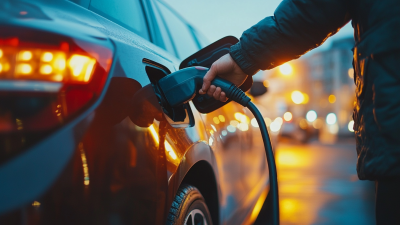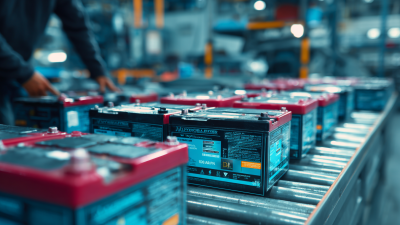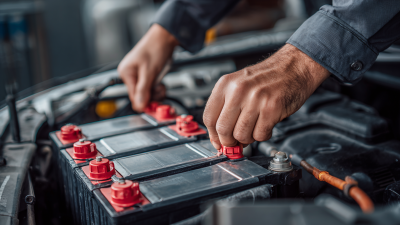What is the Future of New Car Battery Technology
As we stand on the brink of a technological revolution in the automotive industry, the future of new car battery technology is set to redefine the way we think about transportation. With the significant rise in electric vehicle adoption and a pressing need for sustainable solutions, advancements in new car battery capabilities are crucial. Innovations in battery chemistry, energy density, and charging efficiency promise not only to enhance vehicle performance but also to reduce environmental impact.

This blog will explore the myriad reasons driving these advancements, from the integration of cutting-edge materials to the increasing demand for longer-range electric vehicles. Join us as we delve into the future of new car battery technology and uncover what it means for consumers, manufacturers, and the planet as a whole.
Challenges Facing Current Lithium-Ion Battery Technology and Future Alternatives
Lithium-ion batteries have dominated the electric vehicle market for years, but they come with significant challenges that hinder their long-term viability. One of the main issues is their limited range and performance in extreme temperatures. As temperatures drop, the efficiency of lithium-ion batteries decreases, impacting driving distance and charging times. Additionally, concerns about battery safety, particularly the risk of thermal runaway, pose a substantial hurdle for manufacturers aiming to inspire consumer confidence.
Moreover, the environmental impact of lithium-ion batteries cannot be overlooked. The extraction of lithium and other critical materials often leads to environmental degradation and raises ethical concerns regarding labor practices in mining industries. To address these issues, researchers are exploring alternative battery technologies, such as solid-state batteries, which promise improved energy density and safety. Other innovations, like sodium-ion and lithium-sulfur batteries, are also being studied as potential replacements that could alleviate the reliance on scarce resources and lower the environmental footprint associated with production and disposal. These alternatives may redefine the future of electric vehicles, offering a more sustainable and reliable solution for the automotive industry.
The Impact of Solid-State Batteries on Electric Vehicle Performance and Safety
The transition to solid-state batteries is poised to revolutionize electric vehicle (EV) performance and safety. Unlike traditional lithium-ion batteries that rely on liquid electrolytes, solid-state batteries utilize solid electrolytes, which significantly enhances energy density. According to a report from IDTechEx, solid-state batteries can achieve energy densities of up to 500 Wh/kg, compared to 250 Wh/kg for conventional batteries. This increased energy density not only extends the driving range of electric vehicles but also reduces the weight, allowing for more efficient designs.
Moreover, the safety advantages of solid-state technology cannot be overstated. Traditional lithium-ion batteries are vulnerable to thermal runaway, resulting in potential fires or explosions. In contrast, solid-state batteries are less prone to such risks due to their stable solid electrolytes. A study by the U.S. Department of Energy indicates that solid-state batteries can operate in a wider temperature range, reducing the likelihood of failure under extreme conditions. As automakers increasingly invest in this technology, the future of EVs looks not only more efficient but significantly safer.
Impact of Solid-State Batteries on Electric Vehicle Performance
Critical Issues in Battery Recycling and Sustainability in Automotive Industries
As the automotive industry increasingly embraces electric vehicles (EVs), the sustainability of battery recycling has emerged as a critical issue. According to a report by the International Energy Agency (IEA), global sales of electric cars reached 6.6 million in 2021, representing a significant shift towards electrification. However, with this rapid growth comes the challenge of managing end-of-life batteries effectively. It's estimated that by 2030, around 11 million metric tons of used lithium-ion batteries will need recycling, underscoring the urgent need for efficient systems that can recover valuable raw materials like lithium, cobalt, and nickel.
To address these challenges, manufacturers and policymakers must prioritize the development of closed-loop recycling programs. A report from the World Economic Forum suggests that fully recycling EV batteries can reduce environmental impact by up to 90%. This involves not only advancing chemical recovery processes but also investing in local recycling facilities to minimize transportation emissions.
**Tip:** Consumers can play a role in sustainability by choosing manufacturers that prioritize battery recycling practices and support take-back programs for used batteries.
Furthermore, innovation in battery technology, such as solid-state batteries, promises enhanced safety and longevity, potentially decreasing the frequency of battery replacements. Industry analysts predict that the next decade will witness a surge in R&D investments aimed at making battery production and disposal more sustainable.
**Tip:** Stay informed about emerging technologies and advocate for sustainable practices in the automotive industry, helping to shape a greener future for transportation.
What is the Future of New Car Battery Technology - Critical Issues in Battery Recycling and Sustainability in Automotive Industries
| Dimension | Current Status | Future Trends | Challenges |
|---|---|---|---|
| Battery Chemistry | Lithium-ion dominates with a 70% market share. | Rise of solid-state and lithium-sulfur batteries. | Material sourcing and safety standards. |
| Recycling Methods | Current recycling rate is around 5% globally. | Improved technologies for closed-loop recycling. | Economic viability and regulation compliance. |
| Environmental Impact | High carbon footprint in lithium mining. | Focus on sustainable materials and processes. | Balancing efficiency and ecology. |
| Market Demand | Growing demand for electric vehicles. | Expansion into renewable energy storage solutions. | Supply chain disruptions and raw material prices. |
| Policy and Regulations | Increasing regulations on battery disposal. | Stricter global standards for sustainability. | Global disparities in regulatory approaches. |
Emerging Innovations: Lithium-Sulfur and Beyond for Next-Gen Energy Storage
The future of new car battery technology is increasingly leaning towards innovative alternatives beyond traditional lithium-ion solutions. Emerging technologies like lithium-sulfur (Li-S) and sodium-ion batteries are set to play pivotal roles in next-generation energy storage. For instance, lithium-sulfur batteries are gaining traction due to their impressive energy densities, with prototypes achieving levels as high as 700 Wh/kg—far surpassing conventional lithium-ion batteries. This dramatic increase not only enhances the performance of electric vehicles (EVs) but also contributes to the overall efficiency and sustainability of energy storage systems.
Moreover, the global market for advanced battery technologies is anticipated to soar, potentially surpassing USD 400 billion by 2035, largely fueled by the surging demand for battery electric vehicles. Sodium-based batteries are also emerging as formidable contenders; with several companies launching sodium-ion EV batteries, the landscape of energy storage is diversifying rapidly. With ongoing innovations, such as rapid-charging lithium-sulfur batteries that can recharge fully in just 12 minutes, the automotive industry is on the brink of a significant transformation aimed at meeting rising consumer demands and environmental standards.
Market Trends and Predictions for Advanced Vehicle Battery Technologies by 2030
The future of new car battery technology is poised for significant transformation as we approach 2030. Market trends indicate a robust growth trajectory, particularly driven by innovations in lithium-ion battery technology, which have dramatically improved performance metrics such as range and charging efficiency. This enhancement not only fuels consumer interest in electric vehicles (EVs) but also expands their applicability across various market segments, including electric snowmobiles and two-wheeled electric vehicles.
As the global electric vehicle market is expected to grow from $50.02 billion in 2023 to $152.61 billion by 2030, the demand for advanced battery technologies will soar. Key players in the industry are likely to focus on developing high-capacity energy storage systems (ESS) that can meet the increasing power requirements of EVs. The ESS market alone is projected to grow significantly, reflecting a broader trend toward sustainable energy solutions. By investing in cutting-edge technologies, manufacturers can contribute to a cleaner environment while addressing the intricacies of urban mobility, thus positioning themselves at the forefront of the automotive revolution.
Related Posts
-

Challenges in Sourcing the Right Car Battery for Your Global Supply Chain
-

Top 10 Car Battery Manufacturers from China at the 137th Canton Fair
-

How to Choose the Best Top Car Batteries for Your Business Needs
-

Top Strategies for Smart Sourcing: Unlocking the Best Car Battery Purchase for Global Buyers
-

10 Best Tips to Save on New Car Battery Costs
-

Your Ultimate Guide: How to Buy a Car Battery Like a Pro for International Shipping
